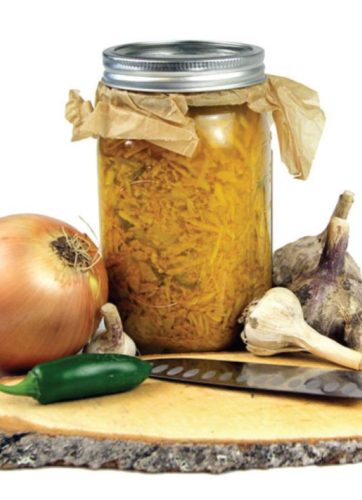As I write this post, the rains have been battering the house for the better part of the day. Fortunately, they can’t dampen (pun unintended) my elation about the successful outcome of a precedent-setting court case recently won by three herbalists. Sounds nerdy, I know. The court battle began in 2014 and I’ve following it since 2015. But the results mean that I can write the title of the post without a trademark – and that’s really important.

A traditional cold remedy commonly used in folk medicine, fire cider is a combination of apple cider vinegar, honey, and spicy herbs that enhances your immune and circulatory systems, is anti-inflammatory, anti-bacterial, anti-viral, and a decongestant. It is a wonderful companion for protecting our good health during the fall and winter seasons.
In 1980, herbalist godmother Rosemary Gladstar coined the term “Fire Cider” and started freely sharing her recipe for it in her published books. The term became widely used by herbalists to refer to similar recipes. In January 2014, a large company trademarked the name “Fire Cider” and began to send nasty legal-grams (“cease sales”) to herbalists telling them to stop selling their fire cider, many of whom had been selling their fire cider for years before the company even existed. Immediately afterward, herbalists started a nationwide boycott of Shire City Herbals after the company refused to revoke their trademark. Later that year, the group Traditions Not Trademark filed a petition to cancel the trademark. In April 2015, the company singled out and sued three herbalists for trademark infringement and damages from the boycott. The issue finally went to trial in 2019.
So why does any of that matter?
Many herbalists see this trademark as the first step in trademarking traditional medicines for profit. One of the greatest benefits of herbs and herbalism is that they have always been widely available to everyone. As stated on the “Free Fire Cider” website, “Many people feel this is a dangerous precedent to anyone who creates and shares recipes anywhere on the web or in books and this led to a filing with the US Patent and Trademark Office asking that the mark be deemed generic.” The anti-trademark movement is trying to keep traditional herbal terms (and recipes) freely available to all and to protect herbalists from being penalized for using common herbal terms.
The outcome of the case sets a legal precedent in future cases where a corporation tries to trademark a generic herbal term (or a term from any other small community). The judge’s decision recognizes that terms are generic in relevant communities. This means that a term does not have to be known to the wider public to be considered generic, and therefore, protected from trademarking.
In celebration of fire cider’s win (and right at the beginning of the cold season!), here is a recipe from Erin McIntosh for Learning Herbs’ Herbal Cold Care course. Ah, sweet (and pungent!) justice.
Fire Cider
• 1/2 cup fresh grated organic ginger root
• 1/2 cup fresh grated organic horseradish root
• 1 medium organic onion, chopped
• 10 organic garlic cloves, crushed or chopped
• 2 organic jalapeno peppers, chopped
• Zest and juice from 1 organic lemon
• Several sprigs fresh organic rosemary or 2 tablespoons dried rosemary leaves
• 1 tablespoon organic turmeric powder
• Organic apple cider vinegar
• Raw, local honey to taste
Prepare all of your cold-fighting roots, fruits, and herbs and place them in a quart jar. If you’ve never grated fresh horseradish, be prepared for a powerful sinus-opening experience! Fill the rest of the jar with the vinegar and cover the jar. If using a metal lid, place a piece of natural parchment paper or wax paper under the lid to keep the vinegar from touching the metal. Shake well!
Store in a dark, cool place for 1 month and remember to shake daily. After 1 month, use cheesecloth to strain out the pulp, pouring the vinegar into a clean jar. Be sure to squeeze as much of the liquid goodness as you can from the pulp while straining.
Next comes the honey! Add 1/4 cup of honey and stir until incorporated. Taste your cider and add [up to] another 1/4 cup until you reach the desired sweetness.
Take 1 Tbsp. in the morning to help warm you up and give your immune system a boost, or 3 Tbsp. at the first sign of a cold.
Note: The herbs can change each year depending on what is growing around you. Basic ingredients are apple cider vinegar, garlic, onion, ginger, horseradish and hot peppers. You can take it by the spoonful, add it to vegetable juice or fried rice, or use on a salad with olive oil. You can also add the strained pulp to shredded vegetables like carrots, cabbage and broccoli for stir fries or spring rolls.

Yay! Grateful for this outcome and the recipe. Said product is sold locally in my area.
Awesome! (If you see fire cider by Shire City Herbals, the boycott of their product is still on!)